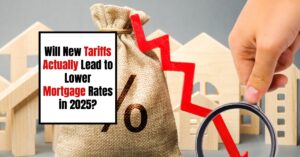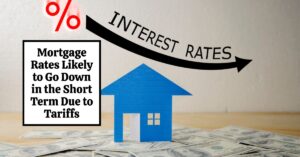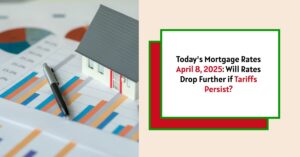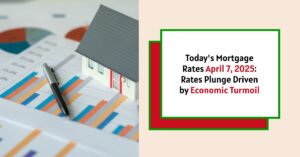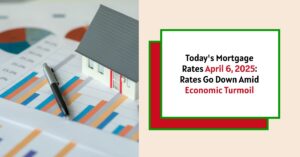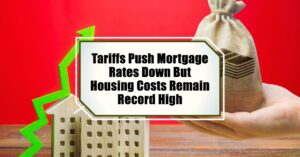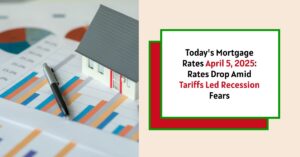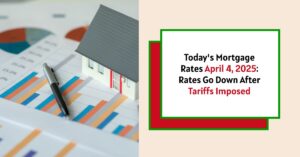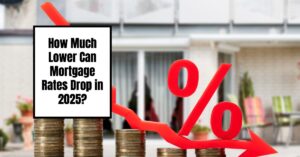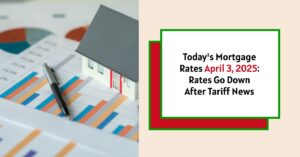Have you ever heard the saying, “It's always darkest before the dawn”? Well, in the world of economics, sometimes things that seem bad on the surface can have unexpected silver linings. Right now, there's a lot of talk about new tariffs, and while my initial reaction might be to worry about higher prices, there's a chance these tariffs could actually push mortgage rates down. It sounds a bit backward, I know, but let's dive into why new tariffs might indeed lower mortgage rates, even if the path isn't exactly straightforward.
Could New Tariffs Actually Lead to Lower Mortgage Rates? Here's What I Think.
The Surprising Link Between Tariffs and Mortgage Rates
Here's the core idea: when there's economic uncertainty, investors tend to look for safer places to put their money. One of those safe havens is typically U.S. government bonds, particularly the 10-year Treasury yield. This yield is a crucial benchmark because it heavily influences the cost of borrowing for things like mortgages, especially the popular 30-year fixed-rate mortgage.
Think of it this way: if new tariffs create worries about the economy slowing down, investors might flock to buy Treasury bonds. This increased demand for bonds can drive their prices up, and when bond prices go up, their yields tend to go down. And as the 10-year Treasury yield falls, so too can mortgage rates. We saw this happen recently when the latest tariffs were announced – the 10-year Treasury yield dipped.
Why Economic Uncertainty Can Be Good for Borrowers (Sometimes)
It feels counterintuitive, I know. You'd think a strong economy would be good for everyone, including homebuyers. And in many ways, it is. But when the economy is booming too much, it can lead to higher inflation. To combat inflation, the Federal Reserve might raise interest rates, which in turn pushes mortgage rates higher.
Tariffs, while intended to protect domestic industries, can sometimes have the unintended consequence of slowing down economic growth due to increased costs for businesses and consumers. If the economy shows signs of cooling, investors might become more risk-averse and, as I mentioned, turn to safer investments like Treasury bonds. This increased demand helps keep those yields, and consequently mortgage rates, in check or even pushes them lower.
The Recent Data Points to This Trend
We've actually seen this dynamic play out recently. Following the announcement of new tariffs, the 10-year Treasury yield saw a decrease. This is a direct reaction to the uncertainty these tariffs introduce into the economic outlook. Some experts have even suggested that this could lead to lower mortgage rates in the short term.
For example, data indicates that the 30-year fixed mortgage rate has averaged around 6.92 percent this year, but it had already dipped to 6.67 percent earlier this month. While there are many factors at play, the reaction of the Treasury yield to tariff news suggests a potential for further downward pressure on mortgage rates.
However, It's Not All Smooth Sailing for Homebuyers
While lower mortgage rates sound great, the impact of tariffs on the housing market isn't entirely positive. Here's where things get a bit more complicated:
- Inflationary Pressures: Tariffs can increase the cost of imported goods, which could lead to higher inflation. Even though lower mortgage rates might make monthly payments a bit more manageable, higher prices for everything else could still strain household budgets and make homeownership less affordable overall. The latest Consumer Price Index already showed overall inflation at 2.8 percent, with housing costs remaining stubbornly high.
- Increased Construction Costs: Tariffs on materials like steel and lumber can significantly increase the cost of building new homes. One study even suggested that existing tariffs could increase new-home construction costs by 4 to 6 percent. Given that new construction makes up a significant portion of the available housing inventory right now, this could further limit supply and keep overall housing prices elevated.
- Economic Uncertainty and Job Security: If tariffs lead to a significant economic slowdown, businesses might be less likely to hire, and some people could even lose their jobs. This increased uncertainty about job security could make potential homebuyers hesitant to make such a major financial commitment, even if mortgage rates are lower. Buying a home is often tied to confidence in one's financial future.
My Take: A Double-Edged Sword
In my opinion, the idea that new tariffs might lower mortgage rates is plausible, at least in the short term. The historical relationship between economic uncertainty, Treasury yields, and mortgage rates suggests this could indeed happen. However, I don't think this is necessarily a straightforward win for homebuyers.
The potential for increased inflation and higher construction costs could offset the benefits of lower mortgage rates. Ultimately, the overall affordability of housing depends on a complex interplay of factors, including interest rates, home prices, and the general economic health of the country.
Recommended Read:
Will Mortgage Rates Go Down in April 2025? Here's What the Experts Say
Expect High Mortgage Rates Until 2026: Fannie Mae's 2-Year Forecast
Potential Opportunities for Some
Despite the uncertainties, lower mortgage rates could create opportunities for certain groups:
- Refinancing: Homeowners who purchased their homes in the last couple of years when rates were higher (around 7 percent) might find that lower rates offer a chance to refinance their mortgages and potentially save a significant amount of money on their monthly payments.
- Buyers in Specific Markets: In areas where there's already a decent supply of homes and demand softens due to economic uncertainty, lower mortgage rates could give buyers more negotiating power and potentially make homeownership more accessible. As one expert put it, “Everything’s this local supply and demand dynamic.”
What Should Potential Homebuyers Do?
Given this complex situation, my advice to anyone thinking about buying a home would be to:
- Stay Informed: Keep a close eye on economic news, particularly reports on inflation, GDP growth, and the housing market.
- Shop Around: Compare mortgage rates from different lenders. Even small differences in rates can add up to significant savings over the life of a loan.
- Assess Your Personal Finances: Carefully evaluate your own financial situation and job security before making a decision. Don't let lower rates tempt you into overextending yourself.
- Do Your Due Diligence: Research the local housing market in your area. Understand the supply and demand dynamics and be prepared to negotiate.
In Conclusion
While new tariffs could create the economic uncertainty that leads to lower mortgage rates, this potential benefit comes with significant caveats. The risk of higher inflation and increased construction costs could still make homeownership challenging. It's a complex situation with both potential opportunities and risks for homebuyers. As always, understanding the bigger economic picture and carefully considering your own circumstances is key.
Work With Norada, Your Trusted Source for
Real Estate Investment in the U.S.
Investing in turnkey real estate can help you secure consistent returns with fluctuating mortgage rates.
Expand your portfolio confidently, even in a shifting interest rate environment.
Speak with our expert investment counselors (No Obligation):
(800) 611-3060
Also Read:
- Will Mortgage Rates Go Down in 2025: Morgan Stanley's Forecast
- Mortgage Rate Predictions 2025 from 4 Leading Housing Experts
- Mortgage Rates Forecast for the Next 3 Years: 2025 to 2027
- 30-Year Mortgage Rate Forecast for the Next 5 Years
- 15-Year Mortgage Rate Forecast for the Next 5 Years
- Why Are Mortgage Rates Going Up in 2025: Will Rates Drop?
- Why Are Mortgage Rates So High and Predictions for 2025
- Will Mortgage Rates Ever Be 3% Again in the Future?
- Mortgage Rates Predictions for Next 2 Years
- Mortgage Rate Predictions for Next 5 Years
- Mortgage Rate Predictions: Why 2% and 3% Rates are Out of Reach
- How Lower Mortgage Rates Can Save You Thousands?
- How to Get a Low Mortgage Interest Rate?
- Will Mortgage Rates Ever Be 4% Again?
